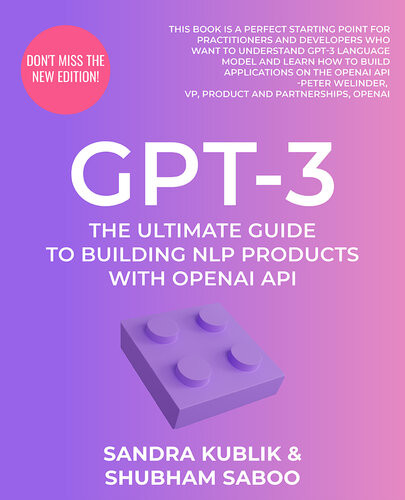

Most ebook files are in PDF format, so you can easily read them using various software such as Foxit Reader or directly on the Google Chrome browser.
Some ebook files are released by publishers in other formats such as .awz, .mobi, .epub, .fb2, etc. You may need to install specific software to read these formats on mobile/PC, such as Calibre.
Please read the tutorial at this link: https://ebookbell.com/faq
We offer FREE conversion to the popular formats you request; however, this may take some time. Therefore, right after payment, please email us, and we will try to provide the service as quickly as possible.
For some exceptional file formats or broken links (if any), please refrain from opening any disputes. Instead, email us first, and we will try to assist within a maximum of 6 hours.
EbookBell Team

5.0
88 reviewsWhat is instantly compelling about this book is that a wide variety of technical backgrounds can read this book and create world-class solutions using AI. —Noah Gift, Executive in Residence at Duke University, Founder of Pragmatic AI Labs
If you’re looking to use GPT-3 or any large language model to build your app or service, this book has everything you need. The book dives deep into GPT-3 and its use cases will help you apply this knowledge to your product. —Daniel Erickson, Founder and CEO, Viable
The authors did a remarkable job of providing a deeper understanding of the technical and societal impact of GPT-3. After reading this book, you will feel confident discussing the state of art in artificial intelligence. —Bram Adams, Founder of Stenography
The book is awesome for beginners! It even has memes and includes a very necessary chapter on AI and ethics, but its real strength is the step-by-step procedures to work with GPT-3. —Ricardo Joseh Lima, Professor of Linguistics at Universidade do Estado do, Rio de Janeiro
A comprehensive deep dive into one of the keystone generative models in natural language processing, with a practical focus on how to use the OpenAI API and integrate it into your own applications. Beyond its technical value, I consider particularly insightful the perspectives provided in the last chapters regarding biases, privacy, and its role in the democratization of AI. —Raul Ramos-Pollan, Professor of AI at Universidad de Antioquia in Medellin, Colombia